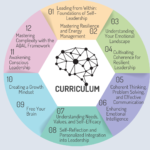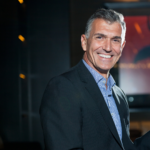Leadership Essentials
The Appleton Greene Corporate Training Program (CTP) for Leadership Essentials is provided by Ms. Franz Certified Learning Provider (CLP). Program Specifications: Monthly cost USD$2,500.00; Monthly Workshops 6 hours; Monthly Support 4 hours; Program Duration 12 months; Program orders subject to ongoing availability.

Personal Profile
Ms. Franz is an expert in self-leadership and modern consciousness development. With over 25 years of experience in the international advertising and film production industry, she has cultivated her expertise in emotional intelligence, leadership, and resilience. Her approach integrates her corporate experience with deep knowledge of human behavior and personal development.
Ms. Franz brings a unique blend of humor, creativity, and curiosity to her work, inspiring those around her to think differently and explore new possibilities. She is known for her flexibility, reliability, and efficiency, effortlessly balancing a free-spirited nature with practical, solution-oriented strategies. Her ability to stay well-organized while fostering a sense of playfulness and innovation has earned her a reputation as both a grounded and visionary leader.
She specializes in supporting executives and professionals to build emotional and mental stability, enabling them to lead with clarity, energy, and authenticity. She is particularly skilled in guiding individuals through personal transformation, equipping them with tools to overcome stress, manage emotions, and achieve self-regulation.
Mr Franz’s qualifications include certifications as an EMDR Trauma Coach, HeartMath® Coach, Life Trust Coach (EASC recognized), and Integral Life Coach. She has also completed advanced training in hypnotherapy, psychological counseling, and spiritual coaching, allowing her to address both practical and profound aspects of personal development.
Her personal and professional achievements, where she has created impactful programs to help individuals strengthen their resilience and expand their potential. Ms Franz’s coaching style is characterized by clarity, compassion, and an unwavering commitment to empowering her clients to lead themselves effectively and live authentically.
Ms. Franz’s service skills include leadership development, self-regulation strategies, resilience building, emotional intelligence, and mindset shifting. She is dedicated to helping her clients unlock their full potential and navigate challenges with strength and confidence.
To request further information about Ms. Franz through Appleton Greene, please Click Here.
(CLP) Programs
Appleton Greene corporate training programs are all process-driven. They are used as vehicles to implement tangible business processes within clients’ organizations, together with training, support and facilitation during the use of these processes. Corporate training programs are therefore implemented over a sustainable period of time, that is to say, between 1 year (incorporating 12 monthly workshops), and 4 years (incorporating 48 monthly workshops). Your program information guide will specify how long each program takes to complete. Each monthly workshop takes 6 hours to implement and can be undertaken either on the client’s premises, an Appleton Greene serviced office, or online via the internet. This enables clients to implement each part of their business process, before moving onto the next stage of the program and enables employees to plan their study time around their current work commitments. The result is far greater program benefit, over a more sustainable period of time and a significantly improved return on investment.
Appleton Greene uses standard and bespoke corporate training programs as vessels to transfer business process improvement knowledge into the heart of our clients’ organizations. Each individual program focuses upon the implementation of a specific business process, which enables clients to easily quantify their return on investment. There are hundreds of established Appleton Greene corporate training products now available to clients within customer services, e-business, finance, globalization, human resources, information technology, legal, management, marketing and production. It does not matter whether a client’s employees are located within one office, or an unlimited number of international offices, we can still bring them together to learn and implement specific business processes collectively. Our approach to global localization enables us to provide clients with a truly international service with that all important personal touch. Appleton Greene corporate training programs can be provided virtually or locally and they are all unique in that they individually focus upon a specific business function. All (CLP) programs are implemented over a sustainable period of time, usually between 1-4 years, incorporating 12-48 monthly workshops and professional support is consistently provided during this time by qualified learning providers and where appropriate, by Accredited Consultants.
Executive summary
Leadership Essentials
The Leadership Essentials program, rooted in the principles of Self Leadership Essentials, is a holistic and innovative training designed to help individual leaders build emotional and mental strength while increasing their resilience. This transformative journey focuses on elevating leaders from within, fostering true leadership that emanates from personal growth and self-mastery. Over the course of 12 months, participants engage in a series of workshops that systematically develop the essential skills necessary for sustained leadership excellence.
In today’s dynamic corporate landscape, where constant change and high demands are the norms, the ability to lead with clarity, resilience, and emotional intelligence is indispensable. Historically, leadership development has often emphasized external tactics and strategic execution, while neglecting the critical inner work of emotional regulation, mental clarity, and personal resilience. Leadership Essentials bridges this gap by offering a comprehensive approach that empowers leaders to cultivate these inner strengths, providing a foundation for enduring success.
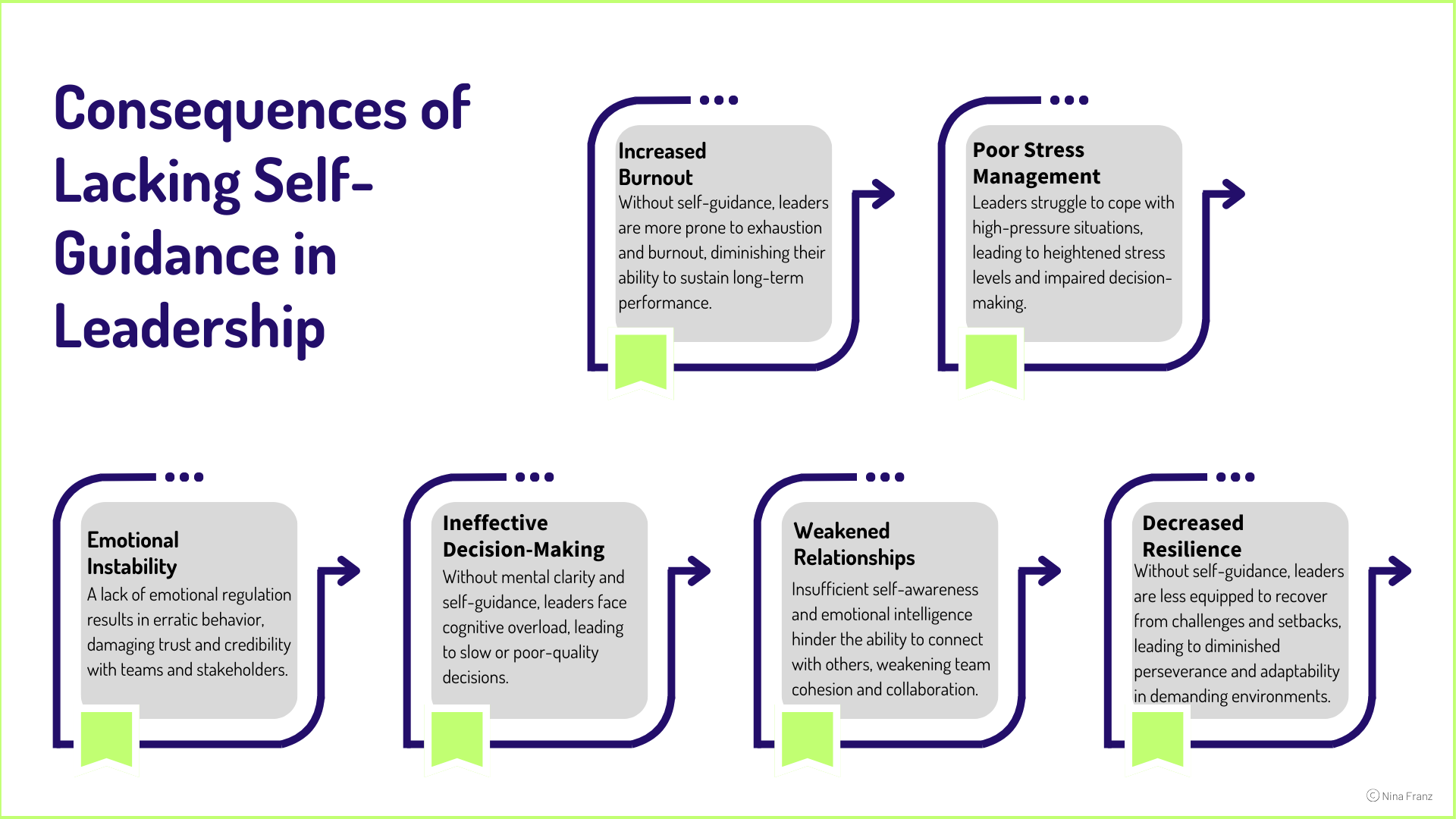
At the core of the program is the belief that true leadership begins from within. Leaders who can regulate their emotions, maintain mental clarity, and build resilience are better equipped to handle the complexities and pressures of their roles. The Self Leadership Essentials framework underscores the importance of developing emotional and mental fortitude, enabling leaders to create a stable, balanced approach to their professional and personal lives. This inner coherence is vital for maintaining high performance, fostering innovation, and leading with authenticity.
One of the most pervasive challenges faced by leaders today is burnout. The relentless demands of leadership often lead to depleted energy reserves, reducing the capacity to perform at a high level. Leadership Essentials directly addresses this issue by teaching leaders how to manage their energy more effectively, regulate their nervous systems, and reduce stress quickly. By fostering resilience and coherence, leaders can sustain their well-being and performance over the long term, even in high-stress environments.
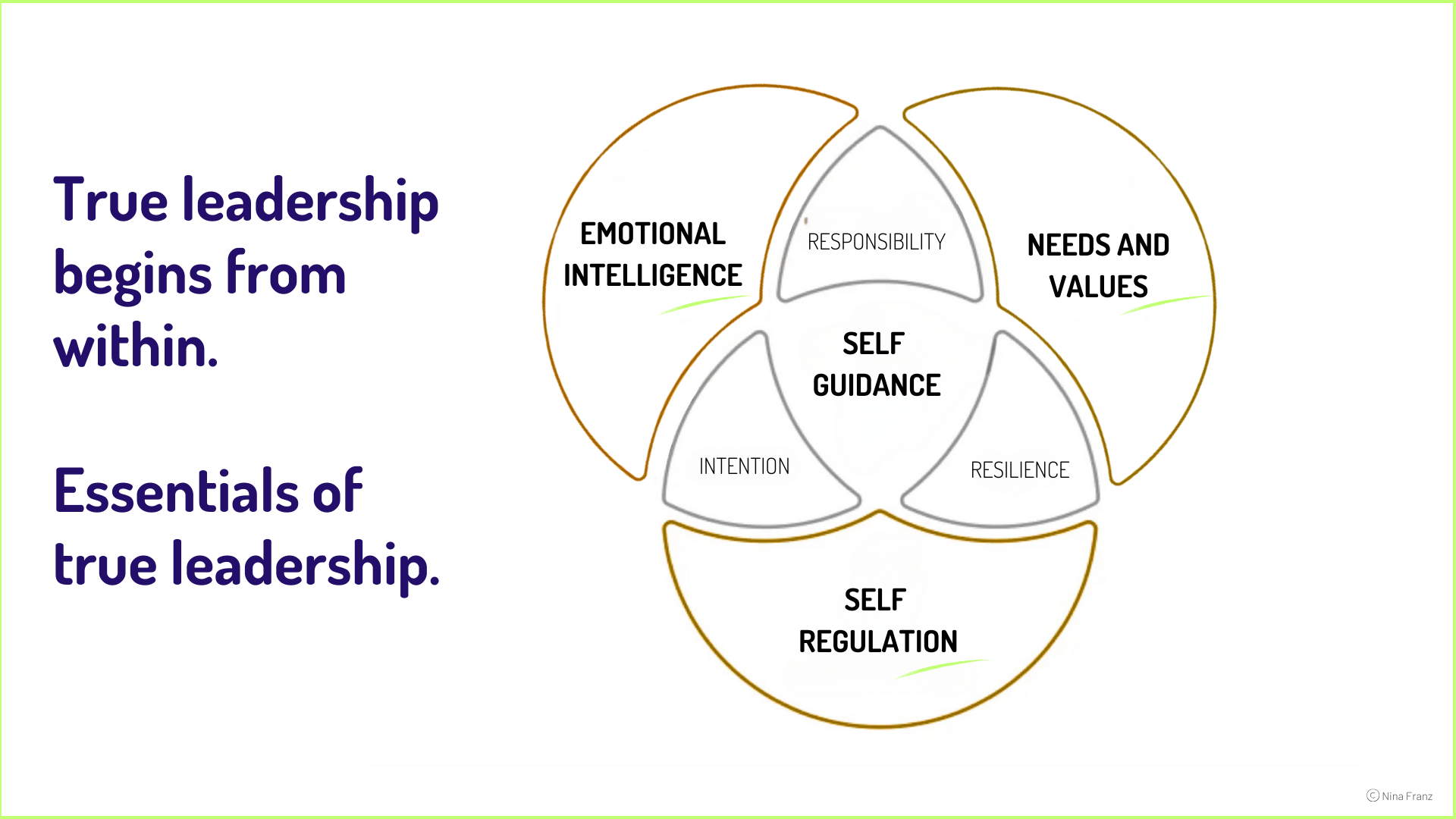
Emotional intelligence is another critical area where many leaders encounter difficulties. The inability to effectively manage one’s emotions or connect with others can hinder communication, weaken relationships, and ultimately impact organizational success. Through Self Leadership Essentials, leaders gain a deeper understanding of their emotional landscapes, learning to navigate their feelings and those of others with greater sensitivity and insight. This enhanced emotional awareness improves communication and strengthens relationships, creating a more cohesive and supportive work environment.
Decision-making is a key aspect of leadership that can become overwhelming, especially in fast-paced, complex situations. Leaders often face cognitive overload, which can impair judgment and slow down critical decisions. Leadership Essentials equips leaders with strategies to streamline their thought processes, reduce mental clutter, and enhance coherent thinking. By fostering a growth mindset, leaders become more agile and open to innovative solutions, driving their organizations forward with confidence and clarity.
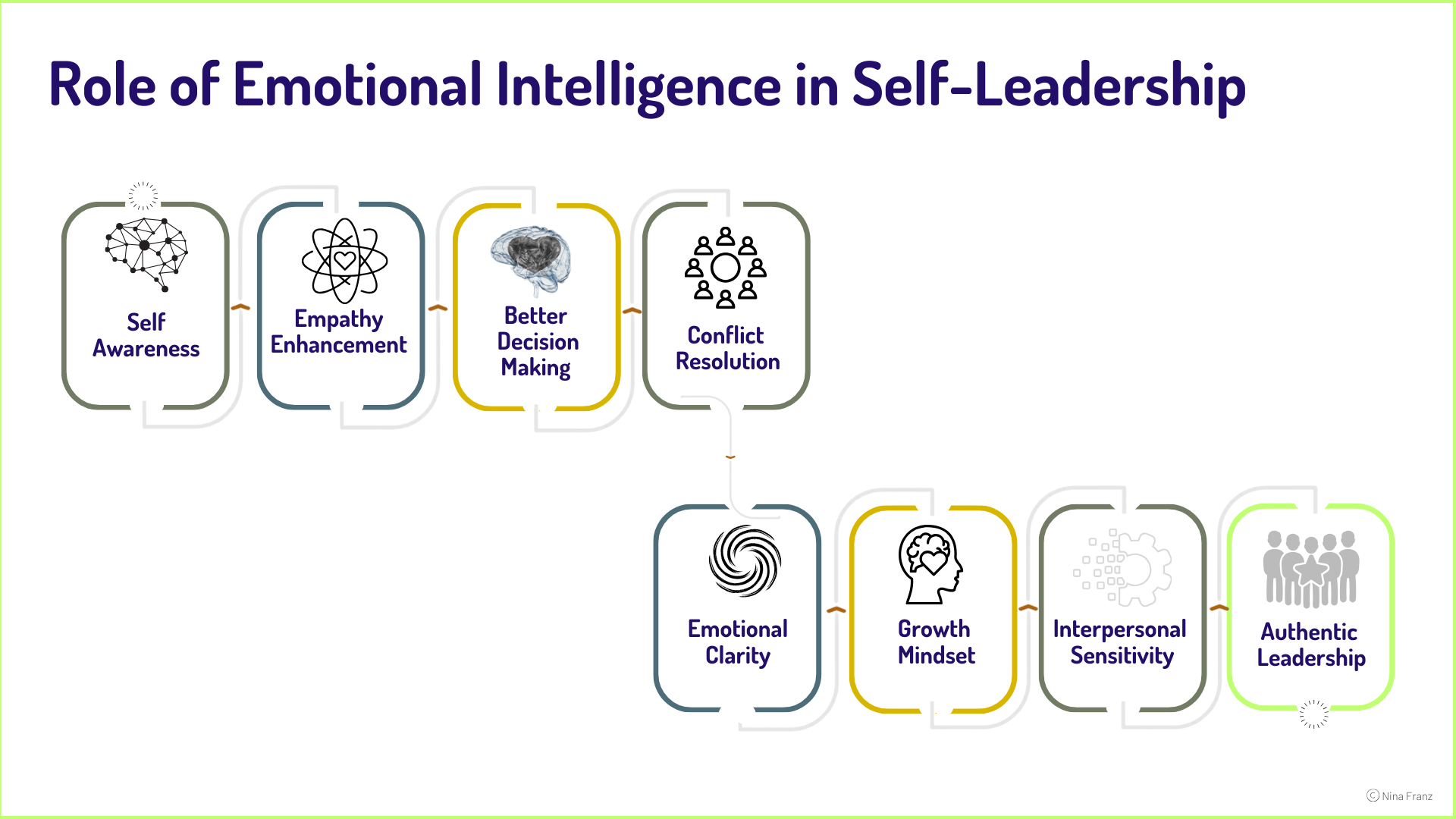
Balancing professional responsibilities with personal well-being is a persistent challenge for many leaders. The pressure to excel in both areas can lead to feelings of disconnection and reduced effectiveness. Leadership Essentials emphasizes the importance of aligning professional goals with personal values, fostering a sense of coherence that supports both personal fulfillment and professional achievement. This holistic approach not only enhances individual well-being but also ensures sustained engagement and effectiveness in leadership roles.
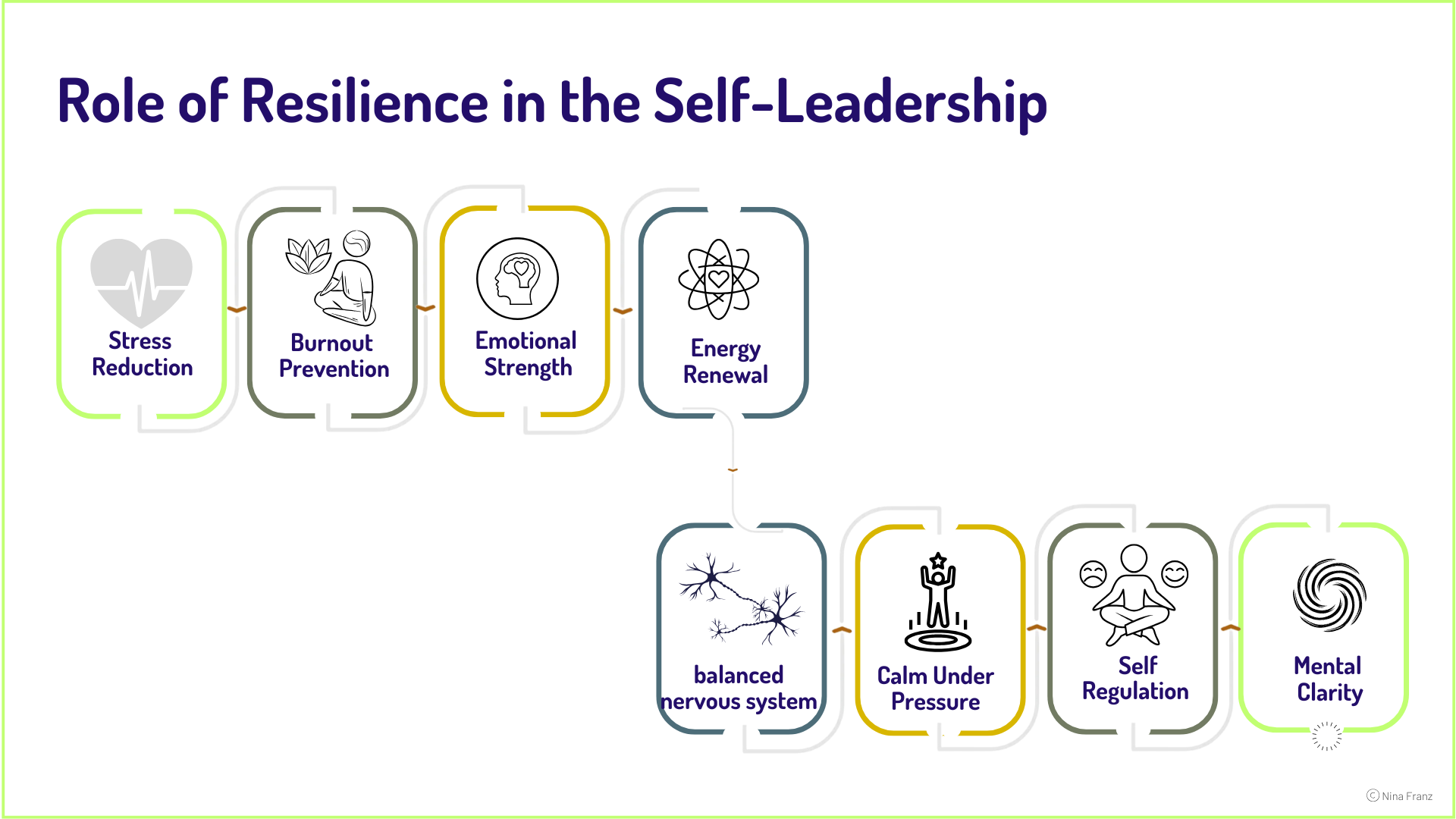
Each month of the Leadership Essentials program builds on the previous, guiding leaders through a cohesive and comprehensive development process. From mastering resilience and energy management to enhancing emotional intelligence and cultivating a growth mindset, the program provides leaders with the tools they need to thrive. By the conclusion of the program, participants will have developed the skills and insights necessary to lead with authenticity, resilience, and purpose.
The Leadership Essentials program is not just a series of workshops; it is a transformative journey that empowers leaders to cultivate the inner resources needed to navigate the complexities of their roles. By focusing on the individual leader’s growth and resilience, Leadership Essentials ensures that participants are well-prepared to meet the challenges of today’s corporate environment, driving sustained success and personal fulfillment.
Curriculum
Leadership Essentials – Part 1- Year 1
- Part 1 Month 1 Leading from Within: Foundations of Self-Leadership
- Part 1 Month 2 Mastering Resilience and Energy Management
- Part 1 Month 3 Understanding Your Emotional Landscape
- Part 1 Month 4 Cultivating Coherence for Resilient Leadership
- Part 1 Month 5 Coherent Thinking, Problem Solving, and Effective Communication
- Part 1 Month 6 Enhancing Emotional Intelligence
- Part 1 Month 7 Understanding Needs, Values, and Self-Efficacy
- Part 1 Month 8 Self-Reflection and Personalized Integration into Leadership
- Part 1 Month 9 Free Your Brain – Reducing Cognitive Load and Embracing Flow
- Part 1 Month 10 Creating a Growth Mindset
- Part 1 Month 11 Awakening Conscious Leadership
- Part 1 Month 12 Mastering Complexity with the AQAL Framework
Program Objectives
The following list represents the Key Program Objectives (KPO) for the Appleton Greene Leadership Essentials corporate training program.
Leadership Essentials – Part 1- Year 1
- Part 1 Month 1 Leading from Within: Foundations of Self-Leadership – In this first workshop, you will explore the foundations of self-leadership, focusing on how to “lead successfully from within.” We’ll examine the importance of self-leadership in today’s fast-changing, complex world and dive into essential aspects: emotional intelligence, coherence, resilience and self-regulation. By reflecting the “8 Pillars of Identity,” you’ll gain a deeper understanding of yourself, enabling you to create stability and clarity. You’ll learn how to leverage your unique strengths to lead more effectively, make a better impact as a leader, and do so with confidence.
- Part 1 Month 2 Mastering Resilience and Energy Management – In this module, you’ll learn about the four core areas of resilience, which form the foundation for sustained performance and well-being. These areas are interconnected, each influencing the others significantly. Many people lose energy throughout the day due to unconscious stress reactions and negative thought patterns. You’ll begin by identifying your own stress triggers, helping you manage stress more consciously and reduce unnecessary energy drains. You’ll also explore how achieving inner coherence—an inner harmony—can help you harness new energy and respond positively in challenging moments. Finally, you’ll set a personal resilience and energy management goal to develop a sustainable approach to your resources and strengthen your leadership impact.
- Part 1 Month 3 Understanding Your Emotional Landscape – In this module, you’ll deepen your emotional intelligence by exploring the purpose of emotions and their connection to stress. You’ll gain insight into your own emotional landscape and learn how emotions impact two key systems in your body. Every day, a wide range of emotions influences our physiology and behavior—even when we’re unaware of them. For leaders, mastering emotional awareness is essential, as it directly affects decision-making, team dynamics, and the ability to remain composed under pressure. This module helps you build awareness around your feelings and develop strategies to manage them effectively, empowering you to lead by example as a mindful, resilient leader.
- Part 1 Month 4 Cultivating Coherence for Resilient Leadership – In this module, you’ll discover how achieving coherence—a state of optimal alignment between body systems—can strengthen your resilience and promote more mindful energy management. Through guided breathing exercises and specific tools, you’ll learn to create inner calm and balance, breaking the cycle of stress and bringing clarity to body and mind. By intentionally fostering positive emotions, you support your health and activate physiological processes that contribute to long-term well-being. This approach not only enhances emotional balance and resilience but also helps prevent burnout, empowering you to maintain sustainable energy and lead with strength and stability.
- Part 1 Month 5 Coherent Thinking, Problem Solving, and Effective Communication – In this module, you’ll develop skills for coherent thinking to enhance problem-solving and improve communication with yourself and your team. You’ll explore the power of self-talk, learning how internal dialogue shapes resilience and impacts your leadership approach. Through principles of salutogenesis, you’ll focus on creating a healthier mindset, fostering positive interactions, and strengthening team dynamics to lead with clarity and purpose.
- Part 1 Month 6 Enhancing Emotional Intelligence – In this module, you’ll dive deep into emotional intelligence, a critical skill for effective leadership. You’ll learn to recognize, understand, and manage your own emotions as well as those of others, improving your empathy and connection with your team. By strengthening emotional awareness and regulation, you’ll enhance your ability to respond thoughtfully in challenging situations, fostering a supportive and motivating environment. This module equips you with the tools to lead with emotional insight and inspire resilience and trust in your team.
- Part 1 Month 7 Understanding Needs, Values, and Self-Efficacy – In this workshop, you’ll explore core needs and values that shape your leadership approach, grounding your understanding in modern psychology and the limbic system. You’ll identify your fundamental needs and learn how they drive behavior and influence your interactions. This insight into self-efficacy empowers you to harness your strengths with greater confidence. By the end of this module, you’ll have crafted your own personal “user manual,” a practical guide to help you lead authentically and effectively in alignment with your values and needs.
- Part 1 Month 8 Self-Reflection and Personalized Integration into Leadership – In this workshop, you’ll deepen your self-reflection skills, focusing on continual self-improvement as a leader and role model. Through the integral life process, you’ll examine how your actions align with your leadership values. A key component of this workshop is developing a personalized plan for integrating these insights into your company, tailored to fit your unique environment and leadership role. This approach empowers you to lead authentically, inspiring positive change within your organization.
- Part 1 Month 9 Free Your Brain – Reducing Cognitive Load and Embracing Flow – In this workshop, you’ll learn strategies to reduce cognitive load and actively enter flow states, a vital skill for navigating today’s challenges. Flow, a state the brain is naturally designed to seek, enables you to handle crises and life’s demands with creativity and ease. While our era offers positive opportunities like knowledge expansion and potential development, it also brings stress, constant overload, and burnout. You’ll explore the VUCA model (Volatile, Uncertain, Complex, Ambiguous) and see how flow states can help you thrive amidst these conditions. Together, we’ll identify ways to enhance flow in your life, improve areas for growth, and make flow an integral tool for resilience and leadership in a complex world.
- Part 1 Month 10 Creating a Growth Mindset – In this workshop, you’ll discover the crucial difference between a fixed and a growth mindset and learn why this shift is essential for success. A mindset is a neurological network, an algorithm that shapes how you process your surroundings. By fostering a growth mindset, you harness the power of neuroplasticity, enabling your brain to continually rewire and expand. Success and fulfillment stem from a willingness to learn, practice with enthusiasm, and evolve over time. You’ll explore techniques to strengthen your growth mindset, empowering you to approach challenges with curiosity and resilience.
- Part 1 Month 11 Awakening Conscious Leadership – In this workshop, you’ll explore the transformative potential of conscious leadership, focusing on self-awareness, resilience under pressure, and cultivating kindness in challenging situations. Building on principles like the Atman-consciousness, this workshop emphasizes that a shift in awareness can profoundly change how you lead. As a leader, awakening to this consciousness equips you with the insight and stability to foster unity and purpose within your team, enhancing resilience across your organization. You’ll learn practical techniques, such as engaging the neural nervous system, to maintain calm and clarity under stress, demonstrating kindness and centeredness even in high-pressure situations. This conscious approach to leadership invites you to embody a higher purpose, inspiring positive change within yourself and those you lead, and contributing to the collective evolution toward a more connected and mindful world.
- Part 1 Month 12 Mastering Complexity with the AQAL Framework – In this final workshop, you’ll explore AQAL model, a framework that helps leaders understand why certain dynamics succeed or fail within teams and organizations. Although organizations often focus on external factors like structure, processes, and responsibilities, they often overlook internal factors—emotions, motivations, and personal values—that play an equally critical role in effective collaboration and leadership. By balancing both external and internal dimensions, leaders can create a work environment that fosters satisfaction, innovation, and motivation. You’ll develop key skills, such as multi-perspective thinking, active listening, and emotional intelligence, to maintain this dynamic balance. This awareness enables you to support both personal and organizational growth, achieving sustainable success through a more integrated and conscious approach to leadership.
Methodology
Leadership Essentials
This 12-month corporate training program emphasizes a structured approach to developing self-leadership, resilience, and emotional intelligence through practical and experiential learning. Each month, participants engage in workshops that deliver hands-on experiences, combining individual and group exercises tailored to the theme of each module. This ensures that the skills acquired are immediately applicable, fostering a lasting impact on participants’ leadership practices.
A central element of the program is the focus on heart-brain coherence, a scientifically validated technique that enhances emotional regulation and decision-making. By achieving coherence between physiological and emotional states, participants can better manage stress and improve mental clarity. This approach helps leaders stay calm and focused, even in high-pressure situations.
The program also emphasizes the development of a growth mindset, encouraging participants to view challenges as opportunities for growth. By shifting their perspective, participants become more adaptable and resilient, which are essential traits in today’s rapidly changing business environment. The cultivation of a growth mindset helps leaders embrace learning and innovation, driving both personal and organizational success.
To tackle the cognitive demands of leadership, the program offers strategies for reducing cognitive load. Participants learn techniques to prioritize tasks, delegate effectively, and streamline their mental processes, which enhances their productivity and overall well-being. This reduction in mental clutter allows leaders to focus on what truly matters, enabling them to make more thoughtful and strategic decisions.
The integration of the 8 Pillars of Identity offers a holistic view of one’s life situation, providing a clear framework for understanding both personal and professional identity. These pillars serve as a guide to navigate through potential biases and blind spots, offering a balanced perspective on the key areas that shape impactful leadership.
This simple yet insightful schema is invaluable in coaching, offering a quick overview of the challenges and sources of satisfaction. It empowers to recognize and strengthen own sources of fulfillment, positively influencing self-worth.
The initial, crucial step in this transformational process is to fully acknowledge the current state and conduct an inventory of the key areas of life. The 8 Pillars of Identity schema aids in providing a swift, clear snapshot of a life situation, laying the groundwork for defining goals and the next steps.
Drawing on insights from modern psychology, the program delves into the complexities of human behavior and motivation. Participants explore theories related to emotional intelligence, cognitive behavioral techniques, and positive psychology, equipping them with tools to navigate interpersonal dynamics effectively. These psychological insights empower leaders to foster more meaningful connections with their teams and drive a positive organizational culture.
The program incorporates tested coaching skills and methodologies, such as the GROW model, which supports participants in setting and achieving their personal and professional goals. By learning to coach themselves and others, participants cultivate a culture of continuous improvement within their teams. This approach not only enhances individual growth but also strengthens the overall leadership capacity of the organization.
The AQAL framework is introduced to help participants understand and manage complex team and leadership dynamics. By considering the internal and external dimensions of individual and collective experiences, participants gain a holistic perspective on leadership. This framework enables them to address the multifaceted challenges of modern organizations, fostering a balanced and integrated approach to leadership.
Reflection and facilitated discussions are key components of the program, allowing participants to deepen their learning through dialogue and peer feedback. Case studies and real-world scenarios are used to contextualize theoretical knowledge, making it relevant and actionable. This reflective practice enhances participants’ ability to apply what they have learned, ensuring that the insights gained translate into tangible leadership improvements.
Finally, the program emphasizes the development of customized strategies for leadership growth. Recognizing that each leader’s journey is unique, the training provides tailored guidance to help participants create personalized action plans.
In sum, this corporate training program offers a comprehensive and holistic approach to leadership development, equipping participants with the skills and insights needed to lead with resilience, emotional intelligence, and authenticity.
Industries
This service is primarily available to the following industry sectors:
Advertising
The advertising industry has undergone significant transformations, with the shift from traditional media such as print, television, and radio to digital platforms. The rise of social media giants like Facebook, Twitter, and Instagram transformed the landscape, allowing for more targeted and data-driven campaigns. Mobile advertising gained traction, driven by the increasing penetration of smartphones and mobile internet.
Today, the advertising industry is a multi-billion-dollar sector with digital advertising accounting for the majority of spend. Social media platforms, search engines, and video streaming services are the primary channels. Personalization and data analytics have become critical, with companies leveraging artificial intelligence (AI) and machine learning to optimize ad delivery and measure effectiveness. Privacy concerns and regulations like GDPR and CCPA have also shaped how data is used in advertising. Influencer marketing has emerged as a powerful tool, with brands partnering with social media personalities to reach specific audiences.
Looking ahead, the advertising industry is expected to further integrate advanced technologies such as augmented reality (AR) and virtual reality (VR) to create immersive ad experiences. The continued growth of the metaverse presents new advertising frontiers. Sustainability and ethical advertising will likely gain prominence as consumers demand greater corporate responsibility. Challenges include navigating increasingly stringent privacy regulations, combating ad fraud, and maintaining consumer trust in an era of data-driven marketing.
The Leadership Essentials program is crucial for advertising professionals navigating these challenges. By fostering emotional intelligence, resilience, and coherent decision-making, the program equips leaders to manage high-pressure environments and innovate effectively. The program’s focus on personal growth and self-mastery ensures that leaders are prepared to meet the demands of a rapidly evolving industry.
Entertainment
The entertainment industry experienced significant changes driven by the rise of streaming services like Netflix, Hulu, and Amazon Prime. This period saw a decline in traditional cable subscriptions as consumers opted for on-demand content. The music industry shifted from physical sales to digital downloads and streaming, with platforms like Spotify and Apple Music gaining prominence. The gaming sector also expanded rapidly, with the rise of mobile gaming and eSports.
Currently, the entertainment industry is dominated by digital streaming across video, music, and gaming. Major players like Netflix, Disney+, and HBO Max compete for subscribers with original content. The pandemic accelerated the adoption of home entertainment, changing consumption patterns. The music industry has embraced streaming as the primary revenue source, while gaming continues to grow with advancements in cloud gaming and virtual reality. The industry also faces challenges related to content piracy and the need for diverse and inclusive representation.
The future of the entertainment industry will be shaped by continued innovation in content delivery and consumption. The metaverse will likely become a new platform for interactive entertainment experiences. Subscription fatigue may lead to new monetization models, such as ad-supported streaming tiers. Challenges include adapting to rapidly evolving consumer preferences, ensuring cybersecurity in digital platforms, and addressing the rising demand for content diversity and inclusion.
Leaders in the entertainment industry can benefit greatly from the Leadership Essentials program. The ability to foster resilience and manage stress is critical in a fast-paced, highly competitive environment. By enhancing emotional intelligence and strategic thinking, the program prepares leaders to innovate and drive their organizations forward amidst constant change.
Media & Marketing
The media and marketing industry began shifting towards digital dominance. Traditional print and broadcast media faced declining revenues as digital media consumption increased. Social media platforms became essential for content dissemination and audience engagement. Content marketing and inbound marketing strategies gained popularity, focusing on providing value to consumers rather than direct selling. Search engine optimization (SEO) and email marketing became key components of digital marketing strategies.
Today, the media and marketing industry is characterized by a highly fragmented media landscape with numerous digital channels. Content marketing remains a cornerstone, with brands creating blogs, videos, and podcasts to engage audiences. The rise of video marketing, particularly on platforms like YouTube and TikTok, has reshaped how brands connect with consumers. Data-driven marketing, using analytics and insights to tailor campaigns, is now standard practice. However, the industry faces challenges related to ad fraud, brand safety, and navigating evolving consumer privacy expectations.
The future of media and marketing will be defined by the integration of AI and machine learning to enhance personalization and predictive analytics. Voice search and smart devices will create new marketing opportunities. Brands will increasingly focus on creating interactive and immersive content, leveraging technologies like AR and VR. Challenges include managing consumer data ethically, combating misinformation, and adapting to the rapid pace of technological change.
The Leadership Essentials program supports media and marketing leaders by enhancing their ability to navigate complex environments. The program’s emphasis on emotional regulation and coherent decision-making enables leaders to address challenges such as data ethics and technological advancements, ensuring strategic agility and sustained success.
Banking & Financial Services
The banking and financial services industry has experienced significant transformation due to technological advancements and regulatory changes. The rise of fintech startups began disrupting traditional banking models, offering services like peer-to-peer lending, mobile payments, and digital wallets. The global financial crisis of 2008 also led to increased regulatory oversight and the introduction of stricter compliance standards.
Currently, the banking and financial services industry is characterized by the widespread adoption of digital banking services. Mobile banking apps, online account management, and contactless payments have become the norm. Fintech companies have expanded into areas like robo-advisors and blockchain-based services. Traditional banks are investing heavily in digital transformation to compete with agile fintech players. Cybersecurity and data privacy have become top priorities as financial institutions handle sensitive customer information.
The future of the banking and financial services industry will likely see increased collaboration between traditional banks and fintech companies. Open banking, enabled by APIs, will allow for more seamless integration of financial services. Blockchain technology has the potential to revolutionize payments, clearing, and settlement processes. Challenges include navigating regulatory complexities, enhancing cybersecurity measures, and addressing the growing threat of digital fraud and financial crimes.
The Leadership Essentials program is pivotal for banking and financial services leaders. The program’s focus on building resilience and emotional intelligence helps leaders effectively manage regulatory pressures and cybersecurity threats. By fostering a growth mindset, participants can drive innovation and build robust, adaptable organizations in a rapidly changing industry.
Healthcare
The healthcare industry began embracing digital health technologies. Electronic health records (EHR) became more prevalent, and telemedicine started gaining acceptance. The industry focused on improving patient outcomes through evidence-based practices and integrating technology into patient care. Innovations in medical devices and diagnostics also advanced, enhancing early detection and treatment capabilities.
Today, the healthcare industry is at the forefront of digital transformation, with telehealth becoming a standard component of care delivery. Wearable devices and mobile health apps empower patients to monitor their health in real-time. Artificial intelligence is being used for diagnostics, treatment planning, and predictive analytics. Precision medicine, which tailors treatments based on genetic profiles, is gaining momentum. However, the industry faces challenges related to data interoperability, cybersecurity, and ensuring equitable access to care.
The future of healthcare will be shaped by continued advancements in digital health technologies and personalized medicine. The integration of AI and machine learning will enhance diagnostics, treatment, and patient care. Telehealth will evolve with the incorporation of virtual reality and remote monitoring tools. Challenges include addressing healthcare disparities, ensuring data privacy and security, and managing the ethical implications of emerging technologies in patient care.Healthcare leaders participating in the Leadership Essentials program gain vital skills in resilience and emotional intelligence, enabling them to lead effectively in high-pressure environments. The program’s focus on coherent decision-making and personal growth prepares leaders to navigate the complexities of digital transformation and patient care innovation.
Locations
This service is primarily available within the following locations:
Berlin
The city transitioned from a historically industrial economy to one based on services, technology, and creative industries. In the past two decades, Berlin emerged as a European tech hub, attracting talent and startups, bolstered by affordable living costs and a vibrant cultural scene.
Today, Berlin is one of Europe’s leading centers for technology, innovation, and entrepreneurship. The city is home to a flourishing startup ecosystem, particularly in fields such as software development, fintech, and green technology. Berlin’s strong cultural appeal, coupled with a growing population, has led to the expansion of both the real estate market and the service sector. The city also benefits from its status as the political capital of Germany, which adds stability and fosters international business connections. However, Berlin’s economy is currently challenged by rapid inflation in housing prices and concerns about a shortage of skilled labor, particularly in the tech sector.
Berlin’s future economic prospects appear promising, particularly in technology and sustainability sectors. The city’s tech industry is likely to continue growing, supported by increasing investment from venture capital, as well as public funding aimed at fostering innovation and green energy initiatives. However, rising living costs, particularly in housing, may be an obstacle to growth unless there are significant policy changes. As remote work continues to rise, Berlin’s economic integration with other global cities will enhance its attractiveness, especially in tech, while its creative industries remain a key driver of cultural and economic vitality.
The Leadership Essentials program is crucial for Berlin’s fast-evolving tech and creative industries, where leaders must navigate rapid innovation, talent shortages, and rising living costs. By equipping leaders with resilience, emotional intelligence, and mental clarity, the program ensures they can foster innovation, build strong teams, and maintain their effectiveness in a highly competitive environment. These skills are vital to sustaining Berlin’s growth in technology and sustainability sectors.
Zürich
Zürich, Switzerland’s financial hub, has long been a center for banking, insurance, and finance. Over the past century, the city’s economy has been primarily driven by the financial services sector, with Zürich being home to some of the world’s largest banks. The city’s high level of economic development also saw a diversification into high-tech industries, life sciences, and pharmaceuticals. Throughout the years, Zürich benefited from its neutrality and strong reputation as a global financial center, attracting multinational corporations and financial professionals.
Zürich remains one of the wealthiest cities in the world, with a strong, diversified economy that includes finance, high-tech industries, and a growing emphasis on sustainability. The city is a leader in global banking and asset management, while also being a prominent player in technology and pharmaceuticals. The continued strength of the Swiss Franc and the city’s focus on high-quality services has ensured its position as an economic powerhouse. However, like many major financial hubs, Zürich faces challenges related to international regulatory changes and competition from other financial centers such as London and New York.
The future outlook for Zürich’s economy remains strong, driven by its continued innovation in finance, technology, and life sciences. In particular, fintech and green energy initiatives will play an increasingly important role in the city’s future economic development. As the global economy evolves, Zürich is well-positioned to embrace digital banking and cryptocurrencies while maintaining its reputation as a stable and secure financial center. However, it will need to navigate challenges such as increasing regulatory pressure and the potential impact of global economic uncertainties on its financial services sector.
In Zürich’s dynamic financial and high-tech sectors, leadership resilience and adaptability are essential for navigating regulatory pressures and driving innovation. The Leadership Essentials program helps leaders align professional excellence with personal well-being, enabling them to embrace challenges like global economic uncertainties and sustain Zürich’s reputation as a stable, forward-thinking hub for finance and technology.
London
London has long been one of the world’s premier financial, cultural, and commercial hubs. Over the centuries, the city evolved into a global trading powerhouse, with a concentration of financial institutions, insurers, and commodity markets. The 20th century solidified London’s role in global finance, with the City of London being home to the London Stock Exchange and some of the world’s largest multinational companies. Despite economic challenges such as the 2008 financial crisis and Brexit, London has maintained its position as a key player on the global economic stage.
London remains one of the world’s most significant financial centers, particularly in areas such as banking, investment, insurance, and fintech. The city has also developed a strong tech sector, with an emphasis on digital media, AI, and data analytics. Post-Brexit, London has experienced some shifts, with financial institutions exploring opportunities in other European cities; however, its economic dominance in areas like digital technology and creative industries has helped mitigate the loss of financial services. London’s high property prices, cost of living, and the growing challenge of a highly competitive labor market are ongoing concerns that affect its position as a global leader.
London’s future is likely to be shaped by continued innovation in fintech, digital technology, and creative sectors. Despite post-Brexit challenges, the city will continue to serve as a key financial hub, capitalizing on its role in digital currencies, blockchain, and AI. London’s global appeal as a cultural and business center will continue to drive economic growth, but addressing housing affordability, social inequality, and labor market competition will be crucial. Additionally, as the financial industry adjusts to new global regulations, London will have to maintain its regulatory edge and build resilience to external economic shocks.
London’s fast-paced financial, technology, and creative industries demand leaders who can handle cognitive overload, maintain clarity under pressure, and innovate amidst uncertainty. The Leadership Essentials program enhances leaders’ ability to balance complex decision-making with emotional intelligence, fostering agility and resilience. These qualities are key to addressing London’s housing affordability, labor market competition, and post-Brexit challenges.
New York
New York has been a dominant force in global finance for over a century, with Wall Street at its heart. The city’s economy has historically been driven by its financial, media, and manufacturing sectors. Over the years, New York has cemented its reputation as a global economic center, drawing multinational companies, investors, and cultural institutions. The city’s transformation into a financial powerhouse was accelerated in the 20th century, with the development of the New York Stock Exchange and the rise of major banks, real estate, and tech firms.
New York City continues to be a global leader in finance, real estate, technology, and media. Wall Street remains a vital component of the global financial system, while the city’s tech sector has grown considerably, with Silicon Alley becoming a major hub for startups and innovation. New York is also home to thriving media, entertainment, and creative industries. However, the city faces significant challenges, including high living costs, income inequality, and infrastructure issues. While New York’s financial services and tech sectors are strong, the city’s competitive housing market and workforce challenges are pressing concerns.
New York’s economic future is promising, as it continues to innovate in finance, technology, media, and sustainability. With a strong focus on technology and green energy, the city will likely maintain its position as a leader in global finance and innovation. However, addressing issues such as income inequality, high housing costs, and infrastructure will be essential for ensuring long-term sustainability. The city’s appeal as a global hub for talent, investment, and cultural exchange will continue to attract businesses and individuals from around the world, while ongoing challenges in social mobility will need to be mitigated.
In New York’s high-pressure environment, where finance, media, and technology intersect, leadership burnout and income inequality pose significant challenges. The Leadership Essentials program helps leaders cultivate resilience and emotional intelligence, enabling them to lead with clarity and foster collaboration in diverse teams. These capabilities are critical for sustaining New York’s global appeal as a center for innovation and cultural exchange.
Rhine-Ruhr Region, Germany
The Rhein-Ruhr Region, traditionally known for its coal mining and steel production, was a cornerstone of Germany’s industrial development in the 19th and 20th centuries. Cities like Essen and Dortmund thrived as industrial powerhouses, contributing significantly to Germany’s economy. However, the decline of these heavy industries in the latter half of the 20th century led to a significant economic transition. The region began diversifying its economy in the 1980s, focusing on services, technology, and logistics.
Today, the Rhein-Ruhr Region is Germany’s largest metropolitan area and a key economic hub in Europe, contributing significantly to the national GDP. It boasts a diverse economy that spans manufacturing, logistics, finance, and technology. Düsseldorf has emerged as a financial center, while cities like Essen have shifted towards energy and technology sectors. The region is also at the forefront of Germany’s energy transition, with a strong focus on renewable energy and sustainability.
The logistics sector remains vital, supported by the region’s strategic location and extensive infrastructure. Additionally, a growing startup ecosystem, particularly in Cologne and Düsseldorf, is driving innovation in digital media, e-commerce, and IT services. Educational institutions like RWTH Aachen University play a crucial role in fostering a skilled workforce and promoting research and development.
The Rhein-Ruhr Region is set to continue its growth by capitalizing on sustainability and digital transformation. With significant investments in green technology and smart logistics, the region aims to be a leader in Europe’s energy transition and digital economy. The manufacturing sector will increasingly adopt Industry 4.0 technologies, enhancing productivity and global competitiveness.
Challenges such as an aging population and the need for workforce upskilling remain, but the region’s strong emphasis on innovation and collaboration between industry and academia positions it well for future success. The Rhein-Ruhr Region is poised to remain an economic leader in Germany and Europe, driving growth through sustainability and technological advancement.
As the Rhine-Ruhr Region transitions into a leader in green technology and digital transformation, leaders must manage workforce upskilling and navigate Industry 4.0 adoption. The Leadership Essentials program empowers them with the tools to foster collaboration, resilience, and innovation, ensuring they can drive growth in sustainability and technological advancement while addressing the challenges of an aging population.
Program Benefits
Marketing
- Emotional Resilience
- Authentic Leadership
- Resilient Communication
- Visionary Thinking
- Crisis Leadership
- Adaptive Marketing
- Strategic Focus
- Self-Regulation
- Emotional Intelligence
- Purposeful Leadership
Human Resources
- Empathy Enhancement
- Stress Management
- Resilient Leadership
- Empowerment Culture
- Energy Management
- Team Cohesion
- Emotional Clarity
- Adaptability Skills
- Goal Alignment
- Conflict Resolution
Management
- Decision-Making
- Leadership Impact
- Crisis Management
- Strategic Alignment
- Energy Renewal
- Influence Mastery
- Resilient Leadership
- Self-Awareness
- Visionary Leadership
- Focus & Clarity
Testimonials
Senior Executive, Delta Innovations
“Working with Ms. Franz has been a transformative experience. The clarity and focus I’ve gained have allowed me to unlock new levels of personal potential. Ms. Franz has a unique ability to guide you toward deep insights, empowering you to make confident decisions from a calm, centered place. My approach to challenges has completely shifted, and I now feel aligned with both my personal and professional aspirations.”
Financial Analyst, Financial Group
“I was on the verge of burnout, constantly overwhelmed by the demands of my role. Ms. Franz provided tools and strategies that not only helped me manage stress but completely reshaped how I view and handle pressure. I’ve found sustainable practices that keep me energized and grounded. This has been a game-changer in both my work life.”
Creative Director, Visions Studio
“The most significant change I’ve experienced is in self-regulating my emotions. I used to feel reactive and out of control in stressful situations. Thanks to Ms Franz, I’ve developed the ability to pause, reflect, and respond thoughtfully. This newfound emotional clarity has brought a profound sense of calm and balance to my daily work life.”
Marketing Consultant, Zenith Strategies
“I used to struggle with indecision and self-doubt, especially in high-stakes situations. Since working with Ms Franz my confidence in decision-making has skyrocketed. I now trust my instincts and approach each challenge with a clear, focused mind. This has not only improved my performance but also given me a stronger sense of control over my career.”
Project Lead, Film Industrie
“Working with Ms Franz on our joint project was an absolute game-changer. I had always been focused on the technical aspects of our work, but Ms Franz brought a new dimension to our approach. By addressing the emotional and mental strength needed for success, [Your Name] helped me and our team tap into deeper levels of creativity and resilience. The impact was immediate—our project moved forward with clarity, efficiency, and energy that I’ve never experienced before. Ms Franz’s unique ability to bring both vision and grounded action to the table is a rare gift that has made this collaboration a major success.”
More detailed achievements, references and testimonials are confidentially available to clients upon request.
Client Telephone Conference (CTC)
If you have any questions or if you would like to arrange a Client Telephone Conference (CTC) to discuss this particular Unique Consulting Service Proposition (UCSP) in more detail, please CLICK HERE.












